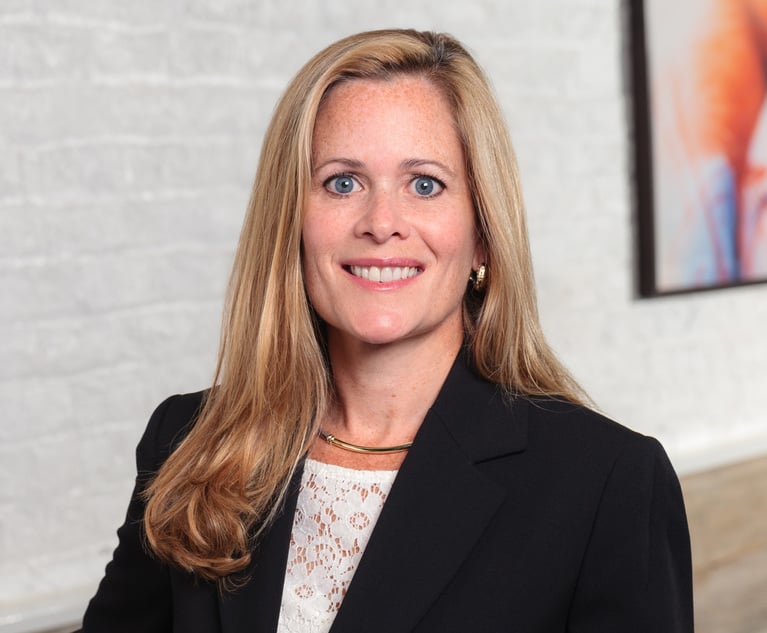 Bettina Warburg, a blockchain researcher and entrepreneur, and co-founder of Animal Ventures.
Bettina Warburg, a blockchain researcher and entrepreneur, and co-founder of Animal Ventures.How Blockchain's 'Paradigm Shift' Puts More Pressure on Legal's Tech Evolution
As part of the Legalweek 2020 Q&A series, Legaltech News speaks with blockchain researcher and entrepreneur Bettina Warburg on blockchain's potential disruption in the legal space, what attorneys most misunderstand about the technology, and more.
February 04, 2020 at 09:00 AM
5 minute read
The original version of this story was published on Legal Tech News
Artificial intelligence may still take up much of spotlight these days, but it's far from the only technology that can fundamentally alter how the legal industry, and the broader economy, operates.
Blockchain technology, for instance, has wide-reaching consequences for record keeping, contracting, data governance and identity management. And beyond that, it may even change how the digital economy functions and work as underlying driver for integrated, autonomously running machines. What all this means for attorneys is that specialization, technical skills, and more technology knowledge will likely become even more important than it is today.
As part of the run-up to Legalweek 2020, Legaltech News is chatting with a number of speakers from this year's sessions to know. Today's Q&A is with Bettina Warburg, a blockchain researcher and entrepreneur, and co-founder of Animal Ventures. She will be headlining the Legalweek keynote address taking place on Wednesday, February 5, at 9 a.m.
Legaltech News: In what forms do you think will blockchain first take off the legal space, and how long until it's as prevalent as AI?
Bettina Warburg: Rather than one specific area of law that will change because of blockchain, I actually see many interesting paradigm shifts that are possible. One shift is in the ability to program business terms or even regulatory conditions into software. The use of blockchain smart contracts to automate different kinds of transactions means that terms that would otherwise rely on written contracts and the threat of litigation are enforced de facto. Of course, this opens up legal terrain for finding recourse when smart contracts have bugs or unintended consequences, but on the whole it is a major shift.
Other paradigm shifts include the ability to notarize or document ideas globally online (patents), verify identities and organizations, the concept of blockchain based e-discovery, and encode permissioning limitations on the flow of data or assets.
What's the one thing those in the legal industry most misunderstand about blockchain?
Not just lawyers, but almost everyone misses the evolution of this technology stack, and what this means for the economy. We are not just in the days of Bitcoin, where one user transfers bitcoin to another user's account. Instead, blockchain should be understood as part of an evolution toward a third generation Web (called Web3) that provides us with virtual machines that are stateful.
Web3 will be the basis of our transition from a digital economy to a decentralized economy. The economic opportunities of the decentralized economy can include wholly new business models: everything from fractionalized ownership and rights to assets that are secured digitally, to new kinds of verifiable and unique assets (such as virtual world avatars), to the ability for machines to transact with one another autonomously. A stateful virtual machine essentially allows us to have a shared verified reality upon which to transact digitally.
While it may sound futuristic, it is also the most obvious use for a digital infrastructure that can verify the transaction of value. Humans have many tools for doing business, but machines require rules and context that can be relied upon at scale. If we expect any of our businesses to automate or integrate algorithms and robots, we should equally be capable of imagining the transaction layer (and state, or context) they'll need in order to serve our economy.
Because blockchains are immutable, is there a concern with how errors recorded on them can be fixed? Is this problem being addressed by today's nascent blockchain technology?
Sometimes we talk about blockchains as "append-only," rather than immutable. The major difference is that immutability has two meanings: 1) that something is permanent, or 2) that it is unchangeable. Blockchains are state machines, and mostly, we care about the current state—or snapshot—of the network to provide context to decentralized applications. We can always perform transactions that append new information to the old, and update the current state of the network to be accurate. This is different than being able to "delete" errors or previous information. Accuracy does not need to rely on deletion.
What do you think can be done to provide lawyers with more blockchain education?
Learning about blockchain is like going down a rabbit hole. You really have to leave some preconceived notions behind. Firms should dedicate time for lawyers to train up on various technology topics, including blockchain, in order to stay on the cutting edge of best practice. There are also books and courses online and taught by universities to help bridge the gap between enterprise and technical knowledge of blockchain.
What is the biggest technology issue facing today's lawyers that you believe isn't talked about enough?
While the digital age has changed many industries, it feels like the legal space has one foot still in an analog world. What will be very challenging for the legal space is now the secondary shift that blockchain and other emerging technologies are bringing about.
It will be hard for lawyers and firms to keep up with the technical changes that can offer a new "standard of practice" for law. Likely, it means a need for greater specialization and/or integration of technical skills and talent among lawyers. Understanding the law will not be enough—rather, having the ability to navigate technology adeptly will be imperative.
What is the one key takeaway you hope people attending the keynote learn?
Blockchains are virtual state machines that provide context to humans and machines. Because of their statefulness, blockchains enable us to program transactions that follow rules that anyone—even machines—can write or execute.
This content has been archived. It is available through our partners, LexisNexis® and Bloomberg Law.
To view this content, please continue to their sites.
Not a Lexis Subscriber?
Subscribe Now
Not a Bloomberg Law Subscriber?
Subscribe Now
NOT FOR REPRINT
© 2024 ALM Global, LLC, All Rights Reserved. Request academic re-use from www.copyright.com. All other uses, submit a request to [email protected]. For more information visit Asset & Logo Licensing.
You Might Like
View All
How I Made Partner: 'Develop a Practice Area You Really Care About ,' Says Jennifer Gniady of Stradley Ronon

How I Made Law Firm Leadership: 'Leaders Must Be Good Listeners,' Says Dan Summerlin of Woods Rogers

How I Made Office Managing Partner: 'When the Firm Needs Something Done, Raise Your Hand,' Says Eric Kennedy of Buchalter

How I Made Partner: 'Persevere Through the Challenging Times,' Says Jennifer Daglio of Hunton Andrews Kurth
Trending Stories
- 1Gibson Dunn Sued By Crypto Client After Lateral Hire Causes Conflict of Interest
- 2Trump's Solicitor General Expected to 'Flip' Prelogar's Positions at Supreme Court
- 3Pharmacy Lawyers See Promise in NY Regulator's Curbs on PBM Industry
- 4Outgoing USPTO Director Kathi Vidal: ‘We All Want the Country to Be in a Better Place’
- 5Supreme Court Will Review Constitutionality Of FCC's Universal Service Fund
Who Got The Work
Michael G. Bongiorno, Andrew Scott Dulberg and Elizabeth E. Driscoll from Wilmer Cutler Pickering Hale and Dorr have stepped in to represent Symbotic Inc., an A.I.-enabled technology platform that focuses on increasing supply chain efficiency, and other defendants in a pending shareholder derivative lawsuit. The case, filed Oct. 2 in Massachusetts District Court by the Brown Law Firm on behalf of Stephen Austen, accuses certain officers and directors of misleading investors in regard to Symbotic's potential for margin growth by failing to disclose that the company was not equipped to timely deploy its systems or manage expenses through project delays. The case, assigned to U.S. District Judge Nathaniel M. Gorton, is 1:24-cv-12522, Austen v. Cohen et al.
Who Got The Work
Edmund Polubinski and Marie Killmond of Davis Polk & Wardwell have entered appearances for data platform software development company MongoDB and other defendants in a pending shareholder derivative lawsuit. The action, filed Oct. 7 in New York Southern District Court by the Brown Law Firm, accuses the company's directors and/or officers of falsely expressing confidence in the company’s restructuring of its sales incentive plan and downplaying the severity of decreases in its upfront commitments. The case is 1:24-cv-07594, Roy v. Ittycheria et al.
Who Got The Work
Amy O. Bruchs and Kurt F. Ellison of Michael Best & Friedrich have entered appearances for Epic Systems Corp. in a pending employment discrimination lawsuit. The suit was filed Sept. 7 in Wisconsin Western District Court by Levine Eisberner LLC and Siri & Glimstad on behalf of a project manager who claims that he was wrongfully terminated after applying for a religious exemption to the defendant's COVID-19 vaccine mandate. The case, assigned to U.S. Magistrate Judge Anita Marie Boor, is 3:24-cv-00630, Secker, Nathan v. Epic Systems Corporation.
Who Got The Work
David X. Sullivan, Thomas J. Finn and Gregory A. Hall from McCarter & English have entered appearances for Sunrun Installation Services in a pending civil rights lawsuit. The complaint was filed Sept. 4 in Connecticut District Court by attorney Robert M. Berke on behalf of former employee George Edward Steins, who was arrested and charged with employing an unregistered home improvement salesperson. The complaint alleges that had Sunrun informed the Connecticut Department of Consumer Protection that the plaintiff's employment had ended in 2017 and that he no longer held Sunrun's home improvement contractor license, he would not have been hit with charges, which were dismissed in May 2024. The case, assigned to U.S. District Judge Jeffrey A. Meyer, is 3:24-cv-01423, Steins v. Sunrun, Inc. et al.
Who Got The Work
Greenberg Traurig shareholder Joshua L. Raskin has entered an appearance for boohoo.com UK Ltd. in a pending patent infringement lawsuit. The suit, filed Sept. 3 in Texas Eastern District Court by Rozier Hardt McDonough on behalf of Alto Dynamics, asserts five patents related to an online shopping platform. The case, assigned to U.S. District Judge Rodney Gilstrap, is 2:24-cv-00719, Alto Dynamics, LLC v. boohoo.com UK Limited.
Featured Firms
Law Offices of Gary Martin Hays & Associates, P.C.
(470) 294-1674
Law Offices of Mark E. Salomone
(857) 444-6468
Smith & Hassler
(713) 739-1250








